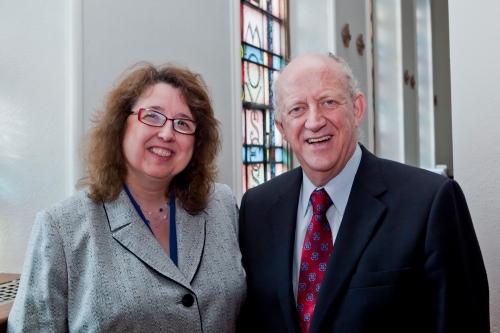
By
Much like athletic or musical talent, faith flourishes with practice, according to Catholic Spiritual Practices: A Treasury of Old and New, a new book co-edited by School of Theology and Ministry Associate Professor Colleen Griffith and Professor Thomas Groome.
Catholic Spiritual Practices is a collection of essays by some of the most respected Catholic writers of today that offers “a treasury of formative practices that will vivify and nurture…spiritual life,” according to Griffith, director of spiritual studies at STM.
“By its very nature, Catholic Christian faith needs to be ‘practiced,’” added Groome. “Likewise, good spiritual practices help us to hand on the faith to the rising generations. As always, what we ‘do’ is more formative than what we may study or encounter in formal catechesis.
“If you were to ask my mentor Paulo Freire, ‘What’s the best way to form Christians?’ he would say, ‘Get them to do Christian things.’ So good practices both express and nurture our faith.”
Catholic Spiritual Practices is the latest title from the award-winning Church in the 21st Century Book Series, which co-sponsored a book launch event earlier this week with STM and the publisher. The volume is organized into three kinds of practice: prayer, care and spiritual growth. Groome and Griffith also contributed essays to the volume, as did Barbara Anne Radtke, an instructional designer for C21 Online, STM’s continuing education program, who writes on spiritual practices in the digital age.
In his essay “The Rosary,” Groome shares the central role praying the rosary had in his childhood home life and the lessons that it taught him. “It taught me the responsibility of praying by myself as well as with others; it taught me that I could pray just about any time and any place.”
The Practices of the Prayer section also highlights praying with images, praying with the saints and the Liturgy of the Hour, among other prayers.
In the Practices of Care section, contributor Ana Maria Pineda, RSM of Santa Clara University, uses the Hispanic Advent ritual of Las Posadas to highlight the importance of extending hospitality to both strangers and family and how hospitality can be put into action through the Corporal Works of Mercy and the Spiritual Works of Mercy.
In writing about carving out deliberate quiet or Sabbath time in her busy family life, contributor Wendy Wright of Creighton University writes, “I am convinced that the conscious cultivation of Sabbath time is essential to our being able to recognize those graced snapshot moments that continually occur in the midst of our busy family lives.” Other Practices of Care essays highlight the value in forgiveness and caring for the environment.
The final section, Practices of Spiritual Growth, is devoted to the transformative power of activities such as retreats, Eucharistic adoration, the Ignatian Examen and fasting, among others.
“Our collection has treasures old and new,” said Groome. “Many are from the tradition, like Lectio Divina and Centering Prayer, but reclaimed and refurbished for our time. There are lots of contemporary practices as well. I think everyone can find something here that they will find engaging and valuable to their ‘practice.’”
According to Griffith, there is notable renewed interest in spiritual practices among Catholics in America, including those on campus. Ben Martin ‘13, co-president of the St. Thomas More Society, said that last year the society and Campus Ministry teamed up to organize an adoration chapel on the first floor of Bapst Library, with adoration available for students and faculty Monday through Friday.
“Practices are an enormously important though under-heralded aspect of our Christian faith,” said Griffith. “People seem interested in moving towards greater spiritual maturity and are eager to learn about spiritual practices that can help foster this.”



